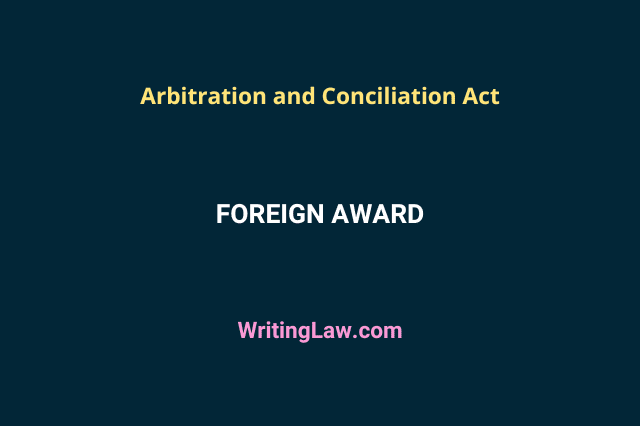
The Indian Arbitration Act of 1940, the Arbitration (Protocol and Convention) Act of 1937, and the Foreign Awards (Recognition and Enforcement) Act of 1961 were the laws that controlled the annulment of domestic awards and the enforcement of foreign awards before the enactment of the Arbitration and Conciliation Act, 1996. The Indian Legislature passed the Arbitration and Conciliation Act, 1961 to put the New York Convention into effect.
This Act was passed in response to the Government of India’s pledge to introduce suitable legislation modifying and reorganising the law under UNCITRAL Model Law and Rules.
In this law note, we will study the concept of foreign awards under ADR and how it differs from domestic awards.
Difference Between Foreign and Domestic Award
To differentiate “international awards” from “foreign awards,” the concept of “domestic awards” has evolved. In the nation where the award is made, a “foreign award” might be viewed as a domestic award. The Act is designed to treat awards made in India and those made outside India differently. All “domestic arbitrations” and “international arbitrations” with a seat in India are subject to Part I of the Arbitration and Conciliation Act. A “challenge” to an award made under section 34 of the Arbitration and Conciliation Act, 1996 may be filed in the case of a domestic award, but no “challenge” action is intended for an award made abroad.
On the other hand, a foreign award is made in an arbitration hearing held outside of India. The term “foreign award” typically only has meaning when used to refer to a contract that will be enforced outside of its country of origin.
Article V of the New York Convention is analogous (comparable in certain aspects) to section 48 of the Arbitration and Conciliation Act, 1996. A party may object to an application for the implementation of a foreign judgement on the few grounds allowed by section 48 of the Arbitration and Conciliation Act, 1996.
Must Read: What Is Arbitral Award and Where Is It Applicable?
Requirements of a Foreign Award
The requirements that an award must fulfil to be called a foreign award are given below:
- The arbitral award must be based on the disagreements between the parties resulting from their legal connection, whether or not that relationship is contractual.
- The arbitral award must be made under a written contract.
- The arbitral award must be made in accordance with a contract to which the Geneva Convention or New York Convention apply.
- The prize must be presented in a nation designated by the Central Government as a “convention country.”
If it meets the requirements for a foreign award’s enforcement, it may then be carried out in India.
Enforcement of a Foreign Award
If certain requirements are met after a foreign award has been recognised by Indian law, it may be enforced.
New York Convention
Section 48 of the Arbitration and Conciliation Act, 1996, contains the requirements for enforcing a New York Convention award. These are:
- Unless the parties to the arbitration agreement were physically or mentally disabled, a foreign award is enforceable.
- Unless the arbitration agreement is found to be unenforceable under the body of law governing its recognition and enforcement, a foreign award shall be enforceable.
- Unless the party against whom the award has been rendered can demonstrate that they were not properly informed of the appointment of the arbitrators or the conduct of the arbitration processes, a foreign award will be enforceable. They must be able to demonstrate that the arbitral panel did not provide them with a fair opportunity to submit their case.
- A foreign award is enforceable unless it resolves a matter/issue unrelated to the one brought before the tribunal. The tribunal must have concluded a matter that was brought before it for consideration.
- A foreign award would not be voidable unless the way the arbitral tribunal was established or the way the arbitration was handled violated the terms of the parties’ agreement or the rules of the law that was adopted to govern the arbitration.
Geneva Convention
Section 57 of the Arbitration and Conciliation Act, 1996, contains the requirements for enforcing a judgement. A foreign judgement will only be enforceable if:
- When compared to the law controlling its enforcement and recognition, the arbitration agreement under which the dispute is brought to arbitration has been deemed to be legal.
- The dispute’s subject matter qualifies for arbitration under Indian law, and as a result of that award, the dispute’s subject matter qualifies as such.
- The tribunal was established, and the procedures were handled in a way that was consistent with the terms of the parties’ agreement or with the law that was selected to regulate the arbitration.
- The award has reached finality, which means it can no longer be contested as to its legitimacy.
- The award’s enforcement won’t conflict with Indian public policy.
Conclusion
The new Act’s (Arbitration and Conciliation Act, 1996) structure is founded on the idea that “it will provide an efficient and speedy way of dispute settlement for both the domestic as well as the international investors.” The statement made by Sir LJ Earl Warren that “the spirit of the law, not its structure, keeps the justice alive” is appropriate. Even while there have been decisions that have agitated the arbitration’s tranquil waters, the overall effort “should be to preserve the spirit underlying the Act, which is precisely the purpose of the new amendment Act”.
Read Next:
1. Arbitration Council of India – Composition, Functions, and More
2. Meaning, Objects, and Essentials of Arbitration Agreement
3. Concept of Conciliation Under ADR – Arbitration and Conciliation Act, 1996
- 13 Characteristics of a Company Under the Companies Act - 5th March 2024
- Lee vs Lee’s Air Farming Ltd – Case Explained - 5th March 2024
- Relevant Facts Under the Indian Evidence Act - 14th January 2024







